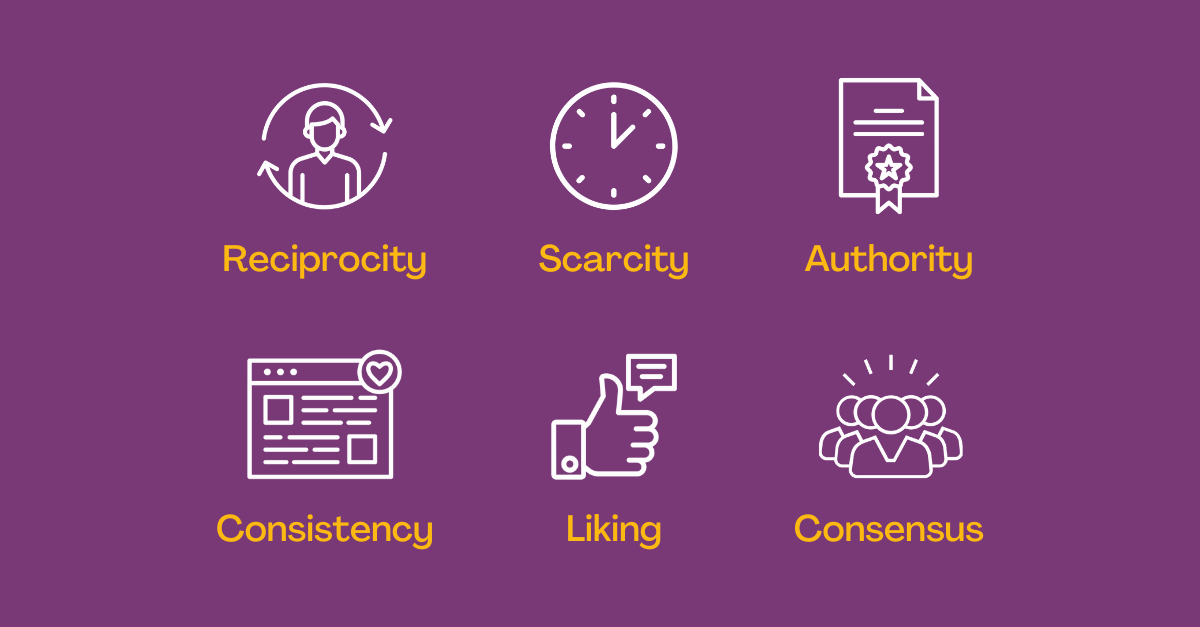
Table of Contents
6 Principles of Persuasive Marketing: The Art of Influence
When it comes to marketing, persuasion isn’t just about convincing someone to buy a product; it’s about creating an emotional connection, building trust, and delivering value in a way that resonates with your audience. Whether you’re a freelance copywriter, a business owner, or a digital marketer, understanding the psychology behind persuasive marketing can help you drive better results. In this blog, I’ll walk you through six powerful principles that have been proven to influence consumer behavior and help you craft more compelling campaigns.
1. Reciprocity: Give and You Shall Receive

The principle of reciprocity is one of the most powerful psychological triggers in persuasive marketing. It’s rooted in the idea that when you give something of value, people feel a natural inclination to return the favor. This doesn’t always mean giving away something for free, but it can involve offering helpful information, creating useful resources, or even delivering excellent customer service.
For example, offering a free ebook, a discount coupon, or even a free trial of your product or service can generate goodwill, prompting potential customers to feel that they should give back by making a purchase or recommending your business to others. It’s about setting the foundation for a relationship built on value.
Apply Reciprocity to drive long term clients:
- Offer free, high-quality content, such as blog posts, guides, or tutorials.
- Provide a bonus or an extra feature with your product or service.
- Engage with your audience through personal messages or appreciation gestures, like thank-you notes.
2. Scarcity: Create a Sense of Urgency

We all know the feeling: when something is limited, it feels more valuable. The principle of scarcity plays on this psychological trigger. When people believe that an opportunity is scarce or there’s a limited-time offer, they’re more likely to take action. This principle is used effectively in everything from flash sales to limited-edition products and time-sensitive discounts.
Scarcity creates urgency and can motivate hesitant buyers to make a purchase before they miss out. Think of it as a way to turn passive interest into immediate action.
How to Apply Scarcity in Marketing:
- Offer time-sensitive deals, such as a 24-hour sale or a countdown timer on a landing page.
- Highlight low stock on your website or product pages (e.g., “Only 5 left in stock!”).
- Run limited-time promotions for new product launches or seasonal sales.
3. Authority: People Trust Experts

In persuasive marketing, the authority principle is all about positioning yourself or your brand as an expert in your field. Consumers tend to trust those who appear knowledgeable and credible. This is why brands often collaborate with industry leaders, influencers, or thought leaders to endorse their products. When people perceive you as an authority, they are more likely to follow your recommendations and make a purchase.
Think about the endorsements you’ve seen in your favorite magazines or social media platforms. When a recognized expert supports a product, it instantly boosts the product’s credibility.
How to Apply Authority in Marketing:
- Highlight certifications, awards, or qualifications that reinforce your expertise.
- Share case studies, testimonials, or success stories from satisfied customers.
- Write thought-leadership content that showcases your knowledge, such as whitepapers, webinars, or industry reports.
4. Consistency: Stay True to Your Word

We all appreciate consistency—it’s reassuring. This principle suggests that once a person commits to something, even if it’s a small action, they are more likely to follow through with larger actions in the future. This can apply to both online interactions and real-life behaviors.
For marketers, consistency means creating a seamless experience across all channels and ensuring your messaging aligns with your customer’s expectations. For example, if a customer opts into your email list for a special offer, they expect the content in your emails to match the promise made. If the email copy or the product offer doesn’t align, the customer may feel misled.
How to Apply Consistency in Marketing:
- Ensure your brand messaging is consistent across all touchpoints: website, social media, email campaigns, and ads.
- Use follow-up strategies to nurture leads and move them through the sales funnel.
- Encourage small commitments from your audience, such as signing up for a free trial or subscribing to a newsletter, which can later lead to bigger purchases.
5. Social Proof: People Follow the Crowd

Social proof is the principle that suggests people are more likely to make decisions based on what others are doing. This is why online reviews, testimonials, and user-generated content (UGC) play such a huge role in modern marketing strategies. When people see others positively interacting with your product or service, they are more likely to trust it and want to experience it for themselves.
Think of it this way: If you’re trying a new restaurant, you’re probably more inclined to go if it’s packed with people, right? That’s social proof in action. You see others enjoying the experience, which validates your own potential experience.
How to Apply Social Proof in Marketing:
- Display customer reviews, ratings, and testimonials on your website and landing pages.
- Highlight the number of people who have purchased or downloaded your product.
- Showcase user-generated content, such as photos or videos from happy customers.
6. Liking: People Buy from Those They Like

The principle of liking is simple yet powerful. People are more likely to be persuaded by someone they like and relate to. This is why personal branding and building authentic connections with your audience are so important. When people feel a connection to you or your brand, they’ll be more inclined to purchase from you.
Whether it’s your tone of voice, your values, or the way you engage with customers, building a rapport with your audience can significantly influence their buying decisions. It’s not just about selling—it’s about building relationships.
How to Apply Liking in Marketing:
- Show your personality through your marketing content—let your brand’s human side shine.
- Engage with your audience on social media and respond to their comments and messages.
- Share behind-the-scenes glimpses of your business or personal life to create relatability.
Bringing It All Together
Mastering persuasive marketing involves understanding these principles and applying them strategically to influence customer behavior. By leveraging reciprocity, scarcity, authority, consistency, social proof, and liking, you can create marketing campaigns that resonate with your audience on a deeper level.
Remember, persuasive marketing isn’t about manipulating customers; it’s about crafting genuine connections, offering real value, and fostering trust. If you can combine these principles with empathy and authenticity, you’ll not only persuade your audience to act—but you’ll also build long-term, loyal relationships with them.
As you build your marketing strategies, consider which of these principles resonate most with your audience and how you can incorporate them into your campaigns. By doing so, you’ll be able to create compelling messages that don’t just sell products, but also inspire action and build lasting brand loyalty.




